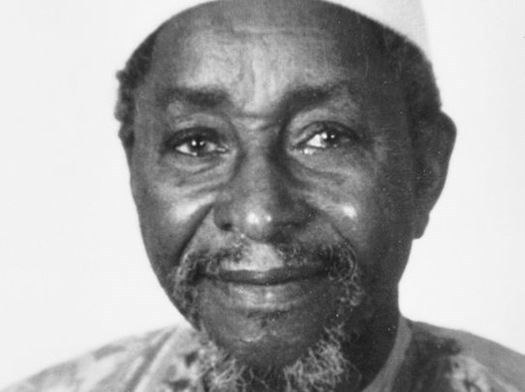 |
| Amadou Hampâté Bâ (http://www.deslettres.fr/damadou-hampate-ba-jeunesse-soyez-au-service-vie/) |
Cantor of the Malian culture and the African wisdom, renowned writer, historian, poet and talented storyteller, Hampâté Bâ was self-taught, having just modest studies in French. He defined himself as a "graduated from the great university of the Spoken Word taught in the shade of baobab trees." Ethnicity Fulah, he was born in 1900 in a religious marabout family in Bandiagara, the capital of the Dogon country which was also the Toucouleurs Kingdom of Macina. Hampâté Bâ was the disciple of Cheikh Hamala and the spiritual son of his uncle Thierno Bokar.
His first lessons of wisdom, Hampâté Bâ has drawn from his Family Universe of a great cultural richness (Dogon, Fulany, bamabara) and his great knowledge in philosophy. Moreover, he attended the French school to become an interpreter of the colonial administration. Very early he crisscrossed the different countries in Africa in order to collect African oral traditions, incorporated on funds of archives and manuscripts, and his main motivation became to transcribe the beautiful and wonderful culture of his country: "it was necessary to save this culture by the written word." He had a famous saying in UNESCO, where he was one of the most brilliant members of the Executive Board from 1962 to 1970: "In Africa, when an old man dies, it's a library burning."
This modest self-made man is a hero for all Africans. In addition to his wisdom and being guardian of African oral tradition, Hampâté Bâ was hundreds of years ahead of his generation. He left a paramount legacy for the universe in general and particularly for young Africans. That's why he wrote a letter to young Africans. Letter of Amadou Hampâté Bâ to African youth: "Be at the service of life in all its aspects" He also highlighted the beauty of diversity by assuming that in our time if big threats of all kinds occur, people must not put the emphasis on only what separates them, but also on what they have in common, in the respect of the identity of each. The meeting and listening to the other is always more rewarding, even for the development of its own identity, than conflicts and sterile discussions to impose its own point of view. Hampâté Bâ was a perceptive person: "Young people, last born of the twentieth century, you live at a time to the frightening times by the threats it poses to humanity and exciting by the opportunities that it opens in the field of knowledge and communication between the people. The generation of the twenty-first century will face challenges of races and of ideas. According to the way in which they will subsume this phenomenon, they will ensure their survival or will cause their destruction by deadly conflicts. In this modern world, no one can any longer take refuge in its ivory tower. All States, whether they are strong or weak, rich or poor, are now interdependent. Whether they want to be or not, the people are embedded on a same boat: a hurricane rises, and all the world will be threatened at the same time. Isn't it better to try to understand and to help each other mutually, before it is too late?"
Here are some of my favorite passages of Hampâté Bâ's letter to African youth: I now turn to you, young black Africans. Perhaps some of you wonder if our fathers had a culture, since they have not left any books. Those who were for so long our masters to live and to think they did not almost managed to make us believe that a people without writing is people without culture? But the culture is not only the oral or written literature, it is also and especially an art of living, a particular way of behaving in a given society, and the entire surrounding natural environment. It is a way to understand the role and the place of man within the creation. The traditional civilization (I talk about particularly of Africa of the savannah to the south of the Sahara, that I know more particularly) was before a civilization of responsibility and solidarity at all levels. In no case a man, whatever he is, was isolated. Never, a woman, a child, a patient or an old man live at the margin of society, as a spare part. There was always a place within the large family, where even the passing foreigner found shelter and food. The community spirit and the sense of sharing headed to all human relationships. The dish of rice, even little, was open to all. One of the major objectives of initiations and the traditional religions was the acquisition, by each individual, a total mastery of self and an inner peace without which there cannot be peace outside. It is in peace and only in peace that the man can build and develop the communities, while the war ruins in a few days what it has taken centuries to build. Young people of Africa and the world, the destiny wanted that in this end of the twentieth century, at the dawn of a new era, you're a bridge between two worlds: that of the past, where old civilizations aspire to only you bequeath their treasures before disappearing, and that of the future, full of uncertainties and difficulties, certainly, but also rich with new adventures and exciting experiences. It is up to you to take up the challenge and to ensure that there is no rupturing activists, but serene continuation and fertilization of one era to another.
Death In 1991, Amadou Hampâté Bâ has left a great work that should be preserved for future generations.
Page created on 3/31/2017 12:00:00 AM
Last edited 3/31/2017 12:00:00 AM
